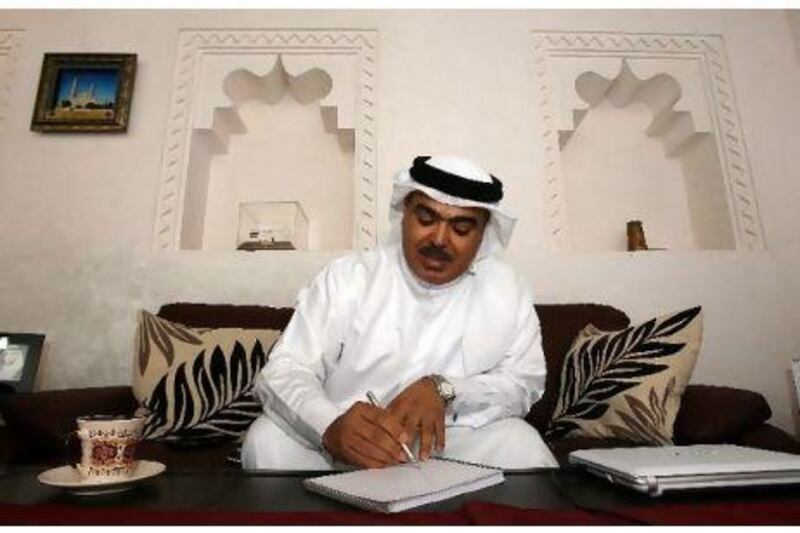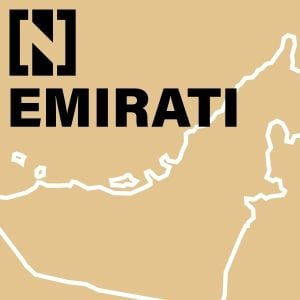SHARJAH // Known as the "fairy tale man", Abdulaziz al Musallam brings the chatter inside the theatre to an immediate silence by uttering just one phrase: "Kan fi qadeem al zaman …" - once upon a time.
Then, he tells pupils a story of a henna tree who flirted with young girls as they crossed his path on their way to get water from a well.
"'Hello, beautiful! Come over here and sit and talk to me'," the tree would say, as narrated last week by Mr al Musallam, who is the director of heritage and culture affairs at Sharjah's Department of Culture and Information.
Mr al Musallam recognised heritage week by going to schools and telling Emirati traditional folktales and "jinn tales".
In this particular fairy tale, all the girls ignored the henna tree except for one, who sat next to him and asked why he kept saying such ridiculous things.
"I love you. If you marry me, all your dreams will come true," the tree said.
The girl agreed, and went to her parents to tell them the news. They found it strange, but agreed to the marriage.
On her wedding day, the bride was dressed in her best clothes as she sat next to the tree.
"'Kiss me,' said the tree, and with a single kiss it turned into a prince. And they both lived happily ever after," he said.
Mr al Musallam later illuminated the significance of the fairy tale, explaining his reasons for telling the fable to a group of teenage female pupils at Wasit School in Sharjah.
"This particular traditional story has several important components, such as a moral message on the importance of not judging someone based on appearance and the implication that women want to be able to go and tell their parents who they want to marry," he said.
Collecting and documenting traditional stories, riddles and proverbs from across the UAE for over three decades, Mr al Musallam regularly gets invited to schools and universities during heritage-related celebrations.
Sharing traditional stories, mostly involving jinn and mystical creatures who often appear in different forms, aims at inspiring new generations of Emiratis to take up an interest in the oral and "less visible" part of UAE heritage.
"The old stories have a lot of wit, riddles and imagination in them, and so we are trying our best to stimulate a young mind to think beyond the obvious and be more creative," said Mr al Musallam.
Some of the tales are based on real stories, in which real names have been lost and some facts have been altered over time. One particular fable has lasted to this day.
In it, people claim that a mystical creature still protects a cave located in an area between Fujairah and Khorfakkan, known as "kahf al daba".
"Taking the form of a dog, with birdlike wings and features, it sits on the top of the cave and comes out when it rains, and throws stones at anyone who tries to take refuge in the cave," said Mr al Musallam. "Whether it is true or not is not as important as making sure the story is passed down to new generations."
Besides celebrating the oral tradition, heritage villages, public libraries and schools were busy during heritage week showcasing Emirati history through everything from traditional dance to stickers to handicrafts.
A new heritage village opened up in Dibba, and airports joined in the celebrations with a traditional tent set up at the arrival terminal with coffee, dates and pamphlets about the UAE.
A new book on UAE heritage, called al Shara, meaning prize or reward, will be released this month by the Abu Dhabi Authority for Culture and Heritage (Adach).
"Everything you ever wanted to know about the UAE, from its dialect to proverbs to social habits, will be in here," said Saeed bin Karaz al Mehairi, the assistant director of Qasr Al Hosn project at Adach and the author of the book.The book, which will be first released in Arabic and then English, comprises 2,544 questions and their answers on every aspect of heritage.
Mr al Mehairi's favourite also happens to be the spoken heritage, with one proverb he likes to repeat.
"At engagements, the tongue is soft with compliments," he said. "The tongue, especially of the husband to be, hardens after marriage," he laughed.
One of Mr al Mehairi's favouritememories is of him at the age of 12, sitting with six older men around a campfire in the desert, exchanging stories. That was in 1977, and the late Sheikh Zayed, the founding President of the UAE, joined in the storytelling fest.
"Heritage is not something that should be taught or enforced. It should come naturally and be part of one's life and routine," Mr al Mehairi said. "Sitting and telling stories of brave princes, mischievous jinn and beautiful princesses was a norm back then, and we all looked forward to it."






